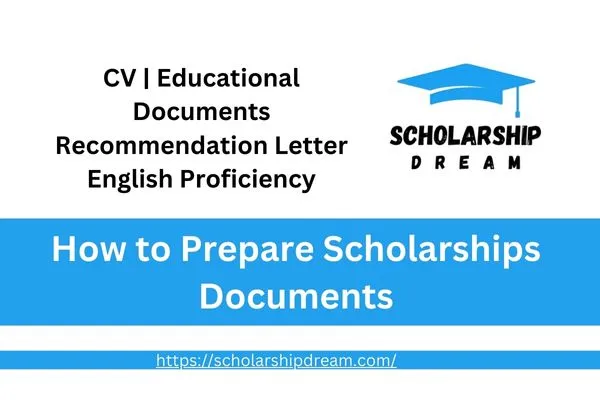How to Prepare Scholarships Documents: A Comprehensive Guide
If you are willing to apply for any kind of scholarship then this blog will be helpful for you as you will get complete guide on How to Prepare Scholarships Documents. Applying for scholarships is a significant step toward achieving your educational goals. A well-prepared set of documents can make a substantial difference in securing the scholarship you deserve. Here’s a detailed guide to help you prepare essential scholarship documents such as CVs, educational documents, recommendation letters, police clearance certificates, and English proficiency certificates.
1. Crafting an Impressive CV
Your CV (Curriculum Vitae) is often the first document scholarship committees review. It highlights your academic achievements, extracurricular activities, and relevant skills. Here’s how to make it stand out:
- Personal Information: Include your name, contact details, and nationality.
- Educational Background: List your qualifications in reverse chronological order.
- Achievements: Mention awards, honors, and recognitions.
- Skills and Certifications: Highlight technical and soft skills, along with any certifications.
- Formatting: Keep it concise, professional, and free from grammatical errors. Use bullet points for clarity.
Complete Guide on Crafting a Good CV.
2. Organizing Educational Documents
Educational documents validate your academic qualifications. Ensure you have the following:
- Transcripts and Diplomas: Obtain attested copies of your high school, bachelor’s, or master’s degrees as required.
- Equivalence Certificates: For international scholarships, you may need certificates confirming the equivalence of your qualifications.
- Translation: Translate documents into the required language if necessary, using certified translators.
Keep both physical and digital copies ready. Use clear, high-quality scans for online submissions.
Follow for More Latest Information:
3. Securing a Strong Recommendation Letter
Recommendation letters provide insight into your character and academic capabilities. Follow these tips:
- Choose the Right Referees: Request letters from professors, employers, or mentors familiar with your achievements.
- Provide Context: Share your goals and the scholarship requirements with your referees to help them write tailored letters.
- Follow Guidelines: Ensure the letter includes the referee’s contact details, signature, and official stamp if needed.
4. Obtaining a Police Clearance Certificate
A police clearance certificate (PCC) verifies your legal and criminal record status. It’s a critical requirement for international scholarships. Here’s the process:
- Apply Locally: Visit your nearest police station or an authorized government office.
- Provide Identification: Submit your national ID card, passport, and any required forms.
- Processing Time: Apply well in advance as the process may take a few weeks.
- Digital Copies: Once issued, scan the PCC for online submissions.
5. Preparing the English Proficiency Certificate
An English proficiency certificate demonstrates your ability to communicate effectively in English, a requirement for many scholarships. Here’s what you need to do:
- Take a Test: Enroll in IELTS, TOEFL, or PTE exams. Achieve the required scores as per scholarship guidelines.
- Request Certification: If your medium of instruction was English, request a proficiency letter from your institution.
- Verify Validity: Ensure the certificate is up-to-date as most are valid for two years.
You can have information about English Proficiency Certificate and Preparation of IELTS.
How to Attest Educational Documents for Scholarships: A Universal Guide
If you’re planning to study abroad, apply for scholarships, or secure a work opportunity overseas, ensuring that your educational documents are properly attested is a critical step. Document attestation is a standard requirement to validate your credentials internationally. While this guide focuses on Pakistani students, the principles apply universally—you should follow the attestation process specific to your country.

Why Is Document Attestation Important?
Attested documents provide authenticity and credibility to your qualifications. Without proper attestation, international institutions, employers, or immigration authorities may reject your application. Commonly attested documents include matriculation and intermediate certificates, bachelor’s and master’s degrees, and transcripts.
An Example on how to attest documents as a Pakistani Student:
1. Matriculation and Intermediate Certificates
- Authority: Board of Intermediate and Secondary Education (BISE) and Inter Board Committee of Chairmen (IBCC) in Pakistan. In other countries, this may involve local education boards or equivalent authorities.
- Process:
- Visit your respective education board office to attest your certificates.
- Follow the secondary-level document attestation procedures relevant in your country.
- Ensure that you carry original certificates, photocopies, and your identification documents.
2. Higher Education Degrees (BS, MS, etc.)
- Authority: Higher Education Commission (HEC) in Pakistan. For other countries, this might be the Ministry of Education or a similar organization.
- Process:
- Create an account on the designated online portal (if available) and schedule an appointment.
- Upload the required documents (degrees and transcripts).
- Submit original documents along with copies to the relevant authority.
- Pay the required fee online or at the office.
3. Ministry of Foreign Affairs (MOFA)
- Documents Covered: All documents attested by prior authorities.
- Process:
- Visit the MOFA office or its regional branches with attested documents and your identification.
- Pay the attestation fee at the designated counter.
- Collect your documents after the process is completed.
Universal Considerations
For students from other countries:
- Check with your national education boards, ministries, or designated authorities for the specific steps and fees.
- Some countries require additional verification from embassies or consulates of the destination country.
- Procedures may vary for public and private institutions.
Example: Attesting Documents for a Scholarship
Suppose you’ve been offered a scholarship at a university in Germany. Here’s how you would attest your documents:
- Matric and Inter Certificates (or equivalent):
- Get your certificates attested by your local education board or equivalent authority.
- Bachelor’s Degree:
- Schedule an appointment on the relevant portal and have your degree attested by your higher education authority.
- Final Step:
- Submit all these documents to the Ministry of Foreign Affairs or equivalent authority for final attestation.
Tips for a Smooth Process
- Double-check requirements for each attestation authority in your country.
- Keep multiple photocopies of all documents.
- Start the attestation process well in advance to avoid last-minute delays.
Views: 399
